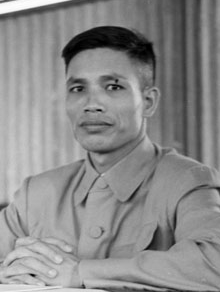Văn Tiến Dũng
| Văn Tiến Dũng | |
|---|---|
 |
|
| Secretary of the Central Military–Party Committee of the Communist Party | |
|
In office 4 July 1985 – 1986 |
|
| Preceded by | Lê Duẩn |
| Succeeded by | Trường Chinh |
| 6th Minister of Defence | |
|
In office February 1980 – February 1987 |
|
| Preceded by | Võ Nguyên Giáp |
| Succeeded by | Lê Đức Anh |
| Member of the Politburo | |
|
In office 20 December 1976 – 18 December 1986 |
|
| Personal details | |
| Born |
2 May 1917 Từ Liêm, Vietnam, French Indochina |
| Died | 17 March 2002 (aged 84) |
| Political party | Communist Party |
| Awards | Resolution for Victory Order |
| Military service | |
| Allegiance | Vietnam |
| Service/branch |
|
| Years of service | 1945–1986 |
| Rank | General |
| Commands | Vietnam People's Army |
| Battles/wars |
First Indochina War Vietnam War |
Văn Tiến Dũng (2 May 1917 – 17 March 2002), born Co Nhue commune, Từ Liêm District, Hanoi, was a Vietnamese general in the People's Army of Vietnam (PAVN), PAVN chief of staff (1954–74); PAVN commander in chief (1974–80); member of the Central Military–Party Committee (CMPC) (1984-1986) and Socialist Republic of Vietnam defense minister (1980–86).
He joined the communist Lao Dong Party in 1936, escaped from a French prison in 1944, and fought against the Japanese occupation force during the Second World War. August 1945, he directed the armed forces to seize power in the province of Hòa Bình, Ninh Bình and Thanh Hóa. By October 1953 during the First Indochina War, Dũng rose to become Chief of Staff of the Vietnam People's Army under General Võ Nguyên Giáp prior to the siege of Điện Biên Phủ in 1954. For the next twenty years, his military reputation in North Vietnam was second only to Giáp's.
He commanded the vital Tri-Thien-Hue Front during the 1972 Easter Offensive, replacing his mentor as PAVN commander in chief in 1974, when the Vietnam War against the Americans and South Vietnamese evolved from a guerrilla struggle to more conventional forms.
Dũng planned and commanded the 1975 Spring Offensive, the final PAVN offensive that defeated South Vietnamese defenses and captured Saigon in 1975. He also directed Vietnam's invasion of Khmer Rouge Cambodia and the resulting border conflict with the People's Republic of China in 1979. He was appointed defense minister in 1980. He retired in December 1986 at the 6th National Congress of the Communist Party of Vietnam.
...
Wikipedia
